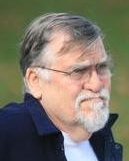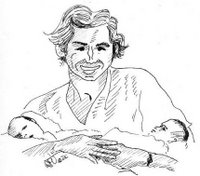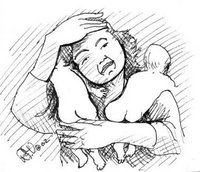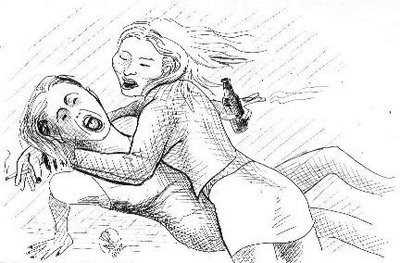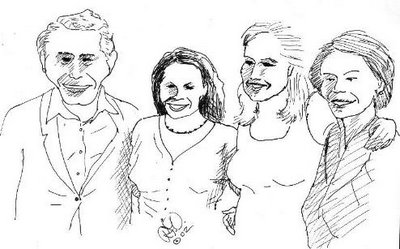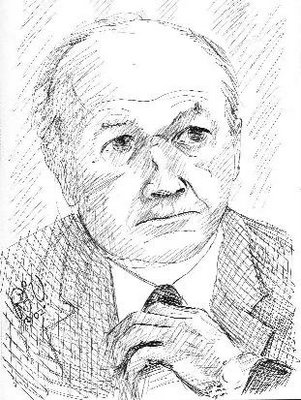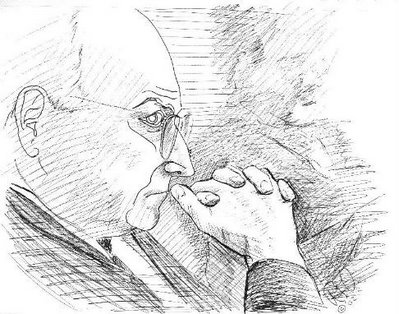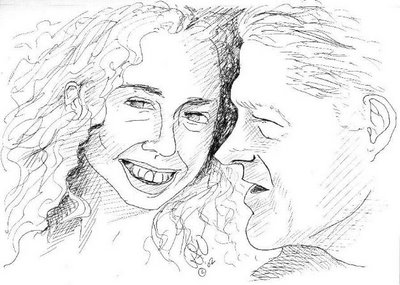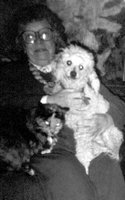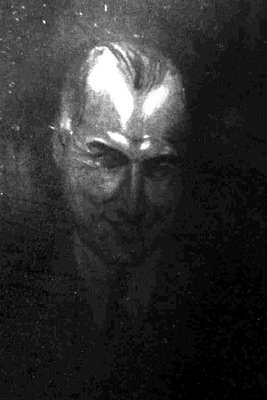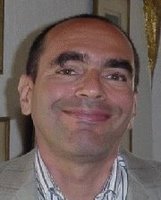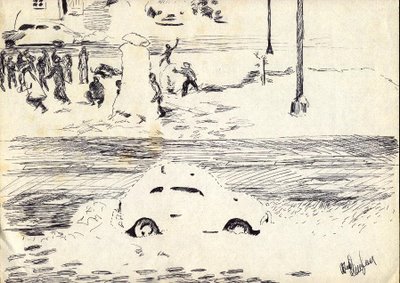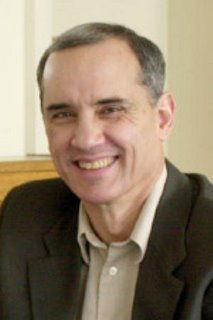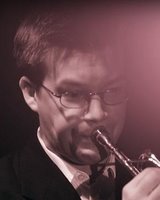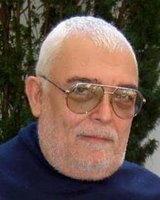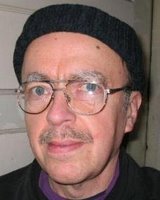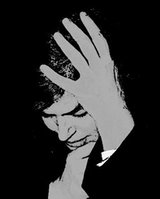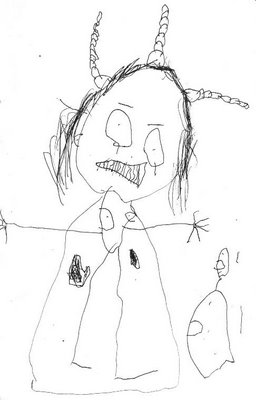I am the great grandson of a yarmulke-wearing Boston jeweler. He
looked very Jewish, but was, of course, a gentile. My father
assured me that we weren't Jewish. We just wore yarmulkes. Or
some of us did, back then. Didn't most gentiles?
Incredibly I never questioned this until recently. How could one
question ones father about his identity? (How could one identify
with ones family?) How could we be Jews (or Christians, for that
matter)? How could I be the other? How could I not be the other?
And, as in an indirect proof in Euclidean geometry, if one
assumes the truth of the premise of my father's tale, i.e., that
we were not Jewish, then contradictions and absurdities follow.
But if one assumes the negation of his premise, i.e., that we
were, in fact, Jewish, then every consequence is plausible.
How probable is it that a gentile could, merely by wearing a
yarmulke, "fool" the turn-of-the-century immigrant Jewish
community in Boston, Massachusetts, as to his status as an
(presumably) observant Jew? And, perhaps, more importantly, why
would he do so, even if he could?
The fundamental assumption of my father's narrative that my great
grandfather wore a yarmulke "to fool the Jews", that is, the
Jewish clientele of the family jewelry business, seems to be
absurdly flawed. Even if one were to assume that Jews bought
jewelry exclusively from Jewish jewelers (never from gentile
jewelers) and that they completely ignored free market
considerations, such as price differences, what percentage of the
population in Boston was Jewish in the period from 1890 to 1930?
(Between 1877-1879 the first census of American Jews conducted by
the Union of Hebrew Congregations determined that only 0.6
percent of the population in the Northeast was Jewish.) Probably
Jews comprised less than 2 percent of the population, i.e., most
prospective clients of any jeweler would be gentiles by a ratio
of more than forty-nine to one! (In Boston Irish Catholics may
have predominated.) Unless, of course, the Jewish 1or 2 percent
of the population of that time period in Boston spent more money
on jewelry than the non-Jewish 98 or 99 percent of the
population! This seems exceedingly unlikely. I have never even
heard this claimed as a stereotype. And, of course, a jeweler who
wore a yarmulke would risk alienating the prospective clients who
were of the 98 or 99 percent gentile majority or at least the
anti-Semitic ones. So, wherein would consist the business
advantage of a gentile jeweler impersonating a Jew in a
predominantly gentile milieu, even if he could do so
successfully?
According to my research, a Reform Jew of the classical period in
question would not have worn a yarmulke ever. A non-Orthodox Jew
who wore a yarmulke would have been a Conservative Jew. But a
Conservative Jew would have worn a yarmulke only when praying or
studying sacred texts (What Is a Jew, by Rabbi Morris N. Kertzer;
The Perennial Dictionary of World Religions, Keith Krim, General
Editor) And a Conservative Jew was more likely to be of Eastern
European origin, rather than German. Only a male Orthodox Jew
wore a yarmulke continuously throughout his waking hours,
including his work.
Hence, I conclude that great grandfather was seemingly either a
German Orthodox Jew who wore a yarmulke in his business or a
gentile who impersonated an Orthodox Jew, because allegedly this
conferred some mysterious business advantage that he would not
enjoy if he were perceived as a gentile. But would not a
turn-of-the-century Orthodox Jew be precisely the most difficult
variety of Jew for a gentile to impersonate? Rather, why not
impersonate a German Reform Jew, who would have been a much
easier study to pass as? But no, a Reform Jew of the era would
not have worn a yarmulke ever, even when praying or studying
sacred texts, certainly not at work. Even in the seemingly
unlikely case that at that time and place it was somehow
essential to be Jewish to prosper in the Jewelry business, since
great grandfather "looked and sounded very Jewish," according to
Father, then his wearing a yarmulke would have been rather
superfluous, if its sole purpose was deception.
Ockham's razor may also be tentatively applied
here. Given various possible explanations for an occurrence,
which are all equally supported by the evidence, the simplest
explanation is to be preferred as the most probable. Doesn't it
seem more internally consistent and logical to conclude that my
great grandfather wore a yarmulke in his jewelry business,
because he was an Orthodox Jew?
Oddly, grandfather was never mentioned as having worn a yarmulke,
only great grandfather. The implication by omission was that he
had not worn one. During this period of history the number,
relative percentage in the population, and the financial status
of Jews in the Northeast were all increasing. Hence, their buying
power was also increasing. So, if it had been necessary for great
grandfather to wear a yarmulke at work in his business in order
to "fool the Jews," why would not this stratagem of deception
have been continued by his son? Grandfather, who was an
elementary school dropout, worked in the family jewelry business
with his yarmulke-wearing father, even as an adolescent. How
could it be possible that the son of an Orthodox Jew (who wore a
yarmulke at work) wore no yarmulke, as they worked side by side?
Great grandfather and grandfather were either Jews or imposters
as Father alleged. Imposters, in order to pass as Jews, would
necessarily have emulated what actual (in this case Orthodox)
Jews would have done. In either case grandfather would also
necessarily have worn a yarmulke, although, I think, probably
only as a young man, before he assimilated. But maybe to admit
this would have brought the "Jewishness" too close to my father,
i.e., his own father had also worn a yarmulke.
It was suggested to me that at the turn-of-the-century the
wholesale jewelry business may have been controlled by Jews.
Hence, in order for a retail jeweler to obtain a "good deal" from
a wholesale jeweler, it might have been necessary for him to be a
Jew. If, in fact, this had been the case, then theoretically it
could explain the case of a gentile, who was a retail jeweler,
pretending to be a Jew in order to obtain the best possible price
from the Jewish wholesale jeweler. This possibility never
occurred to me. And I could think of no convincing refutation of
the argument. But it did not fit with my
father's explanation that the Jewish customers
accepted my great grandfather as a Jew. Years later I learned
that we had no problem dealing with the wholesale jewelers. In
fact my great grandfather was a wholesale jeweler. He was also,
as I correctly inferred, an Orthodox Jew (who had for the most
part assimilated).
I learned that German Jews of that period were generally middle
class business owners or professionals, whereas the immigrant
eastern European Jews tended to have been much poorer. Many of
them had lived in the Lower East Side of New York City and had
worked for very low wages in the garment district, under
deplorable conditions. But on the extremely rare occasions when
father spoke of this, he implied that the Jews were very wealthy.
Even more strangely, I discovered that we were the Jews of whom
he spoke, no doubt extremely wealthy!
I also learned that Charles May had an aunt on his
mother's side, who was from the Goldschmidt
family of Bad Hamburg, a very prominent family of Court Jews or
Hof Jueden, as they were called in German. And, he had an uncle,
Rabbi Dr. Benedikt Samuel Levi, also on his
mother's side, who was the Chief Rabbi of the
Grand Duchy of the Hessen! Doubtless, all were "just pretending"
to be Jews, in order to "fool the Jews"! But, Father certainly
met the Nazis' criterion for being a Jew,
i.e., that of having at least one Jewish grandparent. And,
perhaps, so did I, depending upon the identity of descent of
Charles' wife Millie May
nee' Laster or other genealogical ambiguities.
Yizkor (Remembrance)
Charles May's father was Ferdinand Mayer. Ferdinand's
grandfather, Abraham Mayer, his wife's father, Isaak Simon
Landauer, and both of her grandfathers, Simon Abraham Landauer,
and Salomon Michel from Gelnhausen, were protected Jews
(Schutzjueden or vergleideter Jueden), a phrase whose meaning was
unknown to me. The precise meaning of this term varied with the
particular historical context. Jews did not have the full rights
of citizenship in the various states which now comprise Germany,
until varying dates in the 19th century. Generally, a protected
Jew was one who could afford to pay an exorbitant Jew tax
(Schutzgelt or protection money) to obtain a letter of protection
(Schutzbrief or Geleit) for a specified period of time from the
local secular authorities at various levels of government, which
allowed him and his family to settle in a particular area or city
and practice a profession or to set up a business or to trade
there. Those who could not afford to pay to obtain discriminatory
protection by or from the local baron or authorities were known
as unprotected Jews (unvergleideter Jueden) or, more often,
simply as Jewish beggars (Betteljueden), who were forced to
wander the locality living on charity or to work for a protected
Jew. In some cases only a protected Jew could obtain permission
to marry. A religious marriage of an unprotected Jew would not be
recognized by the local secular authorities. The number of Jews
granted protected status was limited in order to restrict the
growth of the Jewish population in the area. (Sources: the
Jewishgen archives)
Abraham Mayer (Meyer), who was born with the patronymic name
Abraham the son of Meyer, lived in (Frankfurt-) Hedderdheim at
least as early as 1765,according to a Muster List. He married
Theresia Philippina Hess, the daughter of Isaak Hess who died in
Heppenheim, and Babett, whose maiden surname is unknown. (The
surname "Hess" is an Ashkenazic name which means someone
originally from the state of the Hessen, Germany, according to
the previously mentioned book by Dan Rottenberg.) Theresia was
born in 1724 and lived one hundred years, dying in 1824! The
Mayers moved to Mannheim sometime after 1778. In 1779 Abraham
Mayer is listed as being freed from making payments as a
protected Jew in Heddernheim. No longer being required to make
the payments implied that he had become poor by this time. His
daughter's death record states that he was a merchant in Mannheim
while still alive. Hence, it is likely that he died in Mannheim.
Abraham and Theresia Philipinna Mayer had seven children
according to a (Nierstein) Muster List of 1817. David (the son of)
Abraham was born in 1760 and nothing else is known. Meyer was
born in 1761 and he went to Holland. Judas was born in 1763 and
remained in Mannheim. Judith was born in 1763 or 1765 and died in
1838 in Nierstein. She married Benedickt Bloom in 1788 and went
to Nierstein. Wilhelm, Ferdinand's father, was born in 1767 and
it is not known when or where he died. Presumably both Wilhelm
and his wife, Juliette, lived until at least 1826, since neither
is referred to as deceased on the 1826 death record of their
daughter, Babet. Hirsch was born in 1764 or 1768 and died in
1834.He went to Ober-Ingelheim and changed his name to Phillip
Mayer. His first wife was Schoenchen, daughter of David Feist.
His second wife was Esther, daughter of Samuel Loeb. She became
known as Therese. Finally, Jacob was born in 1770 and he went to
Mainz.
In 1796 Wilhelm Mayer married Juliette Hamburg, who was born in
1770 and was from Frankfurt. His profession or business was
trade. In 1817 in Nierstein his wealth or assets was listed as
1000.florin. He also possessed two tillage gardens. Wilhelm and
his family, including Theresia Philippina, the widow of Abraham
Mayer, left Mannheim for Nierstein sometime between 1805 and July
of 1809. They had ten children of whom Ferdinand was the
youngest, according to the 1817 Nierstein Muster List. Therese
was born in 1797. Maximilian was born in 1799 and died after
1864. Max Mayer and his family were granted permission to settle
in Frankfurt in 1835, according to an 1864 application to start
his own wine dealership or wine store in Frankfurt (at the age of
sixty-five). Margaretha was born in 1800. Babet (probably named
after her great grandmother, Philippina's mother) was born in
1801 in Mannheim and died unmarried at age twenty-four in 1826 in
Nierstein. Simon was born in Mannheim at the end of 1802 and died
in Frankfurt on 8 November 1883, at 81 years old, a widower,
living in Frankfurt am Main, Jewish and, independently wealthy,
according to his death certificate. He had a son named Maximilian
who was a merchant. He was married to a Catherine Salomon who may
have been his second wife. Friederich was born in 1807 in
Mannheim and died in 1826 in Nierstein at the age of nineteen. No
wife is mentioned on his death certificate. Judith was born in
1800 or 1806. Henriette was born in 1810. (A Henriette Levi
neé Mayer, the first wife of the Rabbi of the Province,
Dr. Benedikt Samuel Levi, died on 22 December 1842 at age 36 in
Giessen. The birth records for some of her children indicate that
she was from Mannheim. At the time Ferdinand's
sister, Henriette Mayer, was born, the Mayer family was known to
be still living in Mannheim. Henriette's first
child was named Samuel Wilhelm Levi, presumably after her father,
Wilhelm Mayer. Ferdinand was a witness at the birth of the Rabbis
and Henriette's fourth child. Dr. Levi, who
signed some documents as "Rabbi of the Grand Duchy Of the
Hessen", was a witness on the occasion of the birth of
Ferdinand's first son, Isidor Wilhelm Mayer, 6
December 1842. Hence, Rabbi Dr. Benedikt Samuel
Levi's wife was almost certainly
Ferdinand's sister Henriette Mayer. Senior
Rabbi Dr. Levi, who was the son of Rabbi Samuel Wolf Levi, was
born on 14 October 1806 in Worms and died in Giessen on 4 May
1899 at the age of 92 years. He was active as a Rabbi from 1829
through ca.1896. Dr. Levi had the title of "Grandducal Provincial
Rabbi for the Province of Hessen." Kaetchen Mayer
nee' Landauer's paternal
grandmother was Feile Levi of Giessen. Hence, it is not unlikely,
given the Jewish practice at that time of marrying relatives,
that Dr. Levi was also a blood relative of
Ferdinand's wife, Kaetchen.) Johanna,
apparently also known as Jeanne, was born in 1809 or 1811 in
Nierstein. Lastly Ferdinand was born on 26 February 1812 in
Nierstein and died on 14 March 1890 in London, England.
Ferdinand Mayer and his wife, Kaetchen, had eight children, the
first seven of whom were born in Giessen in the Hessen (Germany):
Rosalie (whose marriage to Luis Heim was previously mentioned),
born 4 March 1839; Friedericke Luise, born 5 February 1841;
Isidor Wilhelm, born 6 December 1842; Siegfried Karl ("Charles"),
born 14 December 1844; Emma, born 25 April 1848, married on 8
July 1880 at the Islington Registry Office (a civil marriage),
aged 26, according to the certificate (daughter of Ferdinand May,
independent) Charles Adolph Fieber, aged 41, a boot manufacturer
(son of Carl Fieber, a merchant), in the 1881 London census at 42
Leicester Square a residence is listed with Charles A. Fieber,
aged 42, boot maker, as the head of household, his wife named
Emma, and boarders consisting of a Ferdinand May, aged 69,
retired, and his wife, Katharine, aged 69, both born in Germany,
a surgeon, born in Ireland, a young man with no occupation, born
in Paris, and their nineteen year old servant girl; Georg, born
26 June 1850 (George May) lived in 1894 on Highbury New Park,
London, a road of which a professional researcher (after checking
the 1891 census) said, "looks like a very high class area - lots
of servants"; Moritz, born 6 January 1853; and lastly Anna who
was born in England ca.1854. It is interesting to note the
complete absence of any Hebraic names for the children, possibly
excepting "Anna." It appears that only Charles emigrated from
England to the U.S.A.
The following letter (translated from the German) was written by
Ferdinand's oldest brother, Maximilian Mayer,
who was a merchant born in the Hessen in 1799, probably in
Mannheim. It was written little more than two years after
Ferdinand immigrated to London, England. It seems that Max was
quite involved with the local Jewish community rather than
assimilating and apostate, as was apparently the case for his
youngest brother, Ferdinand.
(To) the Mayor in Nierstein, Mr.Sandmann
Frankfurt, April 6, 1855
Dear Friend!
I previously answered your esteemed letter concerning the matter
of the Synagogue in Nierstein; however, I wanted to wait for the
right moment to introduce the likes of Dr. Stein, which I have
also done but unfortunately without a favorable outcome, as he
let it be known he could not do anything about the matter. This
man is generally very bad-tempered because a lot was lost in this
manner due to his sweeping reform. It is not advisable to appeal
to other philanthropists at this moment, because due to the hard
winter and high price of food these people will be very busy.
Besides, it is inconceivable to me how the Jewish community,
although poor, could sink so far as to be incapable of paying the
trifling sum of the rent. It seems to me more a matter of
indifference and negligence in regards to religious life, than
good will. I am not speaking here about the old people who are
not able to earn very much, but about the young men, who as I
hear are able to support themselves pretty well. If they have any
religious feeling whatsoever, could they truly not afford a small
weekly contribution? Indeed they could and you will concur with
me in this regard dear friend. Apart from that, I will notify you
if I hear anything encouraging.
Live well, and please be assured of my esteem and friendship.
Yours truly,
Max Mayer
Reflection
I find some consolation in the fact that the eminent M.I.T.
mathematician Norbert Wiener, the inventor of cybernetics, also
did not know that he was Jewish! I learned this in an anthology
of essays on Jewish topics, possibly the Jewish Almanac.
Professor Wiener's father was Jewish, but his mother was
Episcopalian. His mother did not want her son to know that he was
Jewish. So his father agreed to raise him without knowledge of
his Jewish ancestry and culture. Lack of knowledge of his Jewish
roots was especially ironic in Norbert Wiener's case, because his
father, who taught at Harvard, had written several acclaimed
scholarly books on the Yiddish language!
Less than five years ago the only genealogy, which was known to
me was that my father's father was William. He was my only living
grandparent at the time of my birth. William died on 3 January
1949 (two months before my fifth birthday), at age seventy-one.
Although I met him, I have no memory of him. I have never seen a
photograph of William.
Grandfather was an elementary school dropout who was said to have
read a book per day. According to tradition, he had a very large
vocabulary, corrected people's grammar and spoke professorially.
He was the son of Charles May And Son Company. He was also a
violin player; a fiddler on the roof of the family wholesale
jewelry business.
William's death notice read as follows:
Framingham News (Massachusetts), Wednesday, January 5, 1949,
Deaths & Funerals: Private Services For William May - Private
funeral services were conducted this afternoon by Rev. John O.
Fisher of the First Parish Unitarian Church (emphasis added) for
William May, 71, retired Boston jeweler of 141 Hollis St., who
collapsed and died Monday morning, at Bigelow Chapel, Mt. Auburn,
Cambridge. Cremation followed. (Perhaps it is interesting to note
that cremation is prohibited under Jewish law.)
Arrangements were in charge of Hollander-Boyle Funeral Service.
(Strangely, there is no mention that he was survived by three of
his four children from his first marriage, by his grandchildren,
and also by his second wife. At least I assume that she was his
wife, although I never could find a record of their marriage.)
Later I discovered that William was named after his father's
(Charles') oldest brother, Isidor Wilhelm. I further learned that
the name "Isidor" was more or less equivalent to the name
"Israel" in Jewish naming patterns. (Etymologically the name
"Israel" means contender with G-d. "Israel" also refers to a
common Jew who is neither a Levite nor a Cohen. During the Nazi
regime, "Israel" was the name that all Jewish males in Germany
were forced to take as a middle name on any official documents or
identification. The mandate for compulsory given names for Jews
began on 17 August 1938.)
Isidor Wilhelm was named after his own grandfather, Wilhelm
Mayer, whose name at birth in ca.1767 (before Jews were required
to take surnames) was the patronymic name "Wilhelm the son of
Abraham". So William, my grandfather, was named after an Israel
Wilhelm who was, himself, named after a Wilhelm the son of
Abraham!
But who was William? And who are we? Remembering with awareness
of various levels of irony the response of Bodhidharma (the
Indian monk who brought Buddhism from India to China) to King
Wu's question, "Who are you?" -- "I don't know"! What is our
identity, if we awaken in the moment from the stories of our
lives and the dreams of our culture? Why did I enter this
incarnation as a Jew, by Reform criteria at least (my maternal
line, consisting of orphans who are descended from orphans, does
not lack ambiguity), without knowledge of this, stripped of so
much of my heritage and cultural identity? In attempting to
uncover my Jewish roots am I "undoing" a pattern of karma of my
ancestors or laboring to "undo" my own pattern of karma from a
previous life or another life in which I negated or denied my
Jewish identity?
It is interesting to note that traditionally most groups in the
ancient world traced their membership and descent patrilineally.
The Jews (Israelites) were originally no exception to this rule,
as is illustrated by various Biblical stories. The practice of
including patrilineal descent as a determinant of identity is, of
course, recognized and continued by Reform Jews and
Reconstructionist Jews, even today. Between 200 C.E. - 300 C.E.
(the precise date is unknown) the Jews changed to the principle
of matrilineal descent. The change to matrilineal descent has
been called an historic misinterpretation (from an academic
rather than a religious perspective) of a certain Mishnaic rule
(M. Qiddushin 3:12).
But, perhaps, I'm only a "homeopathic" Jew, not of pure stock?
Do I need to have reverse rhinoplasty? No, being of Jewish descent
is a lineage not a percentage, not a blood disorder, as the Nazis
maintained. And, in any case, homeopathy teaches us that even a
miniscule dosage can have a profound effect!







